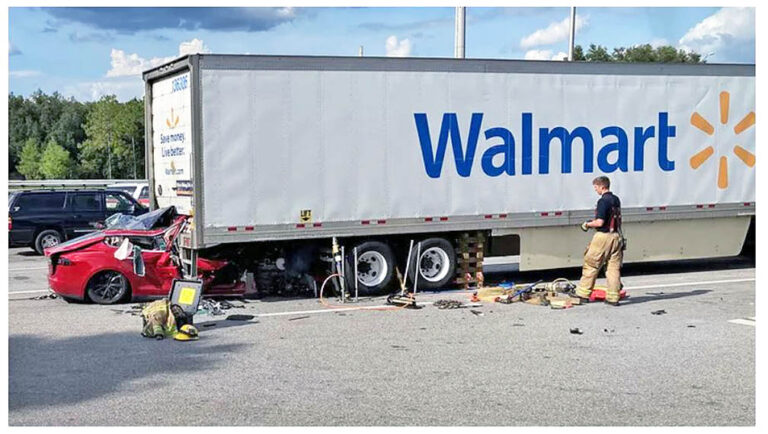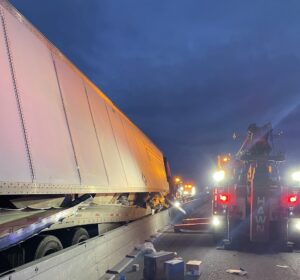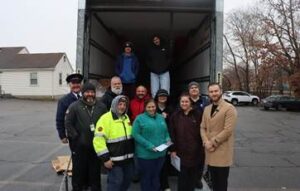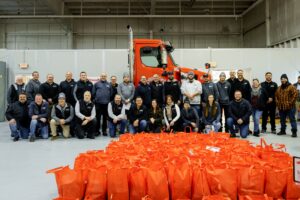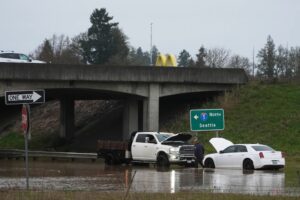DETROIT — The U.S. government’s auto safety watchdog is sending investigators to another Tesla crash, this time one that killed two people along Interstate 75 in Florida.
The National Highway Traffic Safety Administration (NHTSA) confirmed Friday that it sent a Special Crash Investigations team to probe the Wednesday crash into the back of a Walmart semi-trailer at a rest area near Gainesville.
The agency would not say if the Tesla was operating on one of the company’s partially automated driving systems.
The 2015 model year Tesla was traveling on Interstate 75 about 2 p.m. Wednesday when, for an unknown reason, it exited into a rest area. It then went into the parking lot and hit the back of a parked Walmart Freightliner tractor-trailer, the Florida Highway Patrol said in a release.
The driver and passenger, both from Lompoc, California, were pronounced dead at the scene.
Highway Patrol Lt. P.V. Riordan said Friday night in an email that his agency will determine whether any partially automated features were in use. “That is a consideration that will be explored during our investigation,” he said.
A message was left seeking comment from Austin, Texas-based Tesla.
NHTSA is investigating 37 crashes involving automated driving systems since 2016. Of those, 30 involved Teslas, including 11 fatal crashes that have killed a total of 15 people.
The agency also said in documents that it’s investigating a fatal pedestrian crash in California involving a Tesla Model 3 that happened this month. It also sent a team to probe a Cruise automated vehicle crash in California that caused a minor injury in June.
NHTSA also has been investigating Teslas on Autopilot crashing into parked emergency vehicles. In a separate probe, the agency is looking at Teslas on Autopilot braking for no apparent reason.
Last week, newly confirmed NHTSA Administrator Steven Cliff told The Associated Press that the agency is intensifying efforts to understand the risks posed by automated vehicle technology so it can decide what regulations may be necessary to protect drivers, passengers and pedestrians. He also says automated systems such as automatic emergency braking have huge potential to save lives.
In June, NHTSA released data from automakers and tech companies showing nearly 400 crashes over a 10-month period involving vehicles with partially automated driver-assist systems, including 273 with Teslas.
The agency cautioned against using the numbers to compare automakers, saying it didn’t weight them by the number of vehicles from each manufacturer that use the systems, or how many miles those vehicles traveled.
Automakers reported crashes from July of last year through May 15 under an order from the agency, which is examining such crashes broadly for the first time.
Tesla’s crashes happened while vehicles were using Autopilot, “Full Self-Driving,” Traffic Aware Cruise Control, or other driver-assist systems that have some control over speed and steering. The company has about 830,000 vehicles with the systems on the road.
The next closest of a dozen automakers that reported crashes was Honda, with 90. Honda says it has about 6 million vehicles on U.S. roads with such systems.
Tesla’s crash number may appear elevated somewhat because it uses telematics to monitor its vehicles and get real-time crash reports. Other automakers don’t have such capability, so their reports may come slower or crashes may not be reported at all, NHTSA said.
Auto safety advocates said driver-assist and self-driving systems have potential to save lives, but not until NHTSA sets minimum performance standards and requires safety improvements to protect all road users.
The Associated Press is an independent global news organization dedicated to factual reporting. Founded in 1846, AP today remains the most trusted source of fast, accurate, unbiased news in all formats and the essential provider of the technology and services vital to the news business. The Trucker Media Group is subscriber of The Associated Press has been granted the license to use this content on TheTrucker.com and The Trucker newspaper in accordance with its Content License Agreement with The Associated Press.








